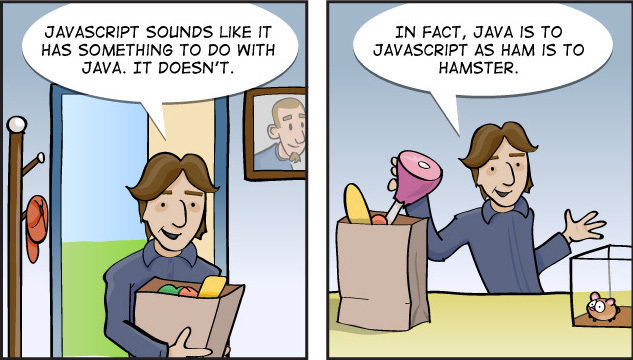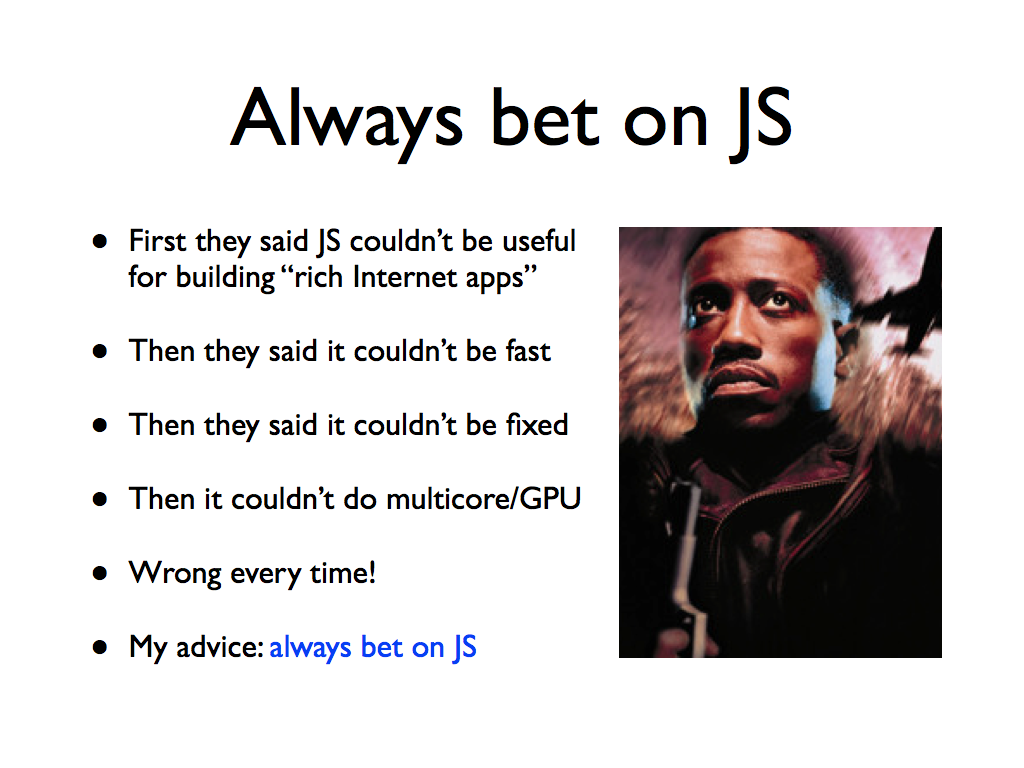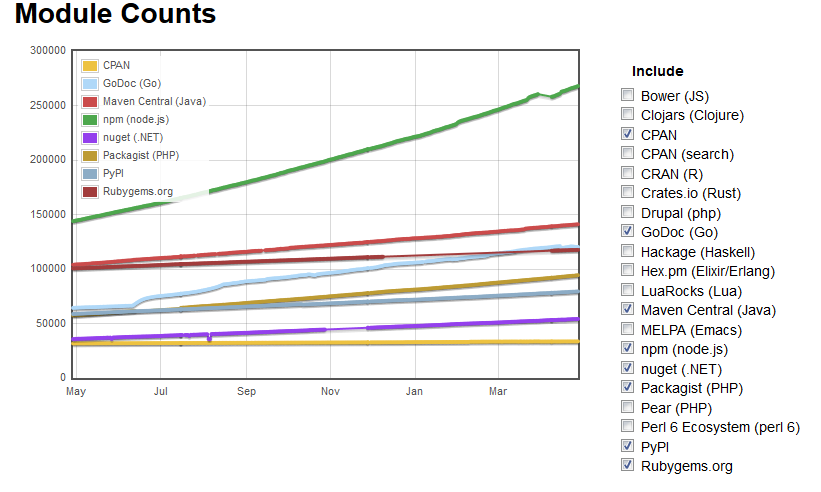JavaScript

The good, the bad, the ugly!
About me

Catalin Andrei
dev@ACCENTURE
I work on project: "SmartHome"
I'm an open source & home automation enthusiast (aka. geek).
Member of G.R.E.E.N@ACCENTURE
What is this talk about?

JavaScript
What is this talk about?

JavaScript
history
What is this talk about?

JavaScript
reasons to learn it
history
What is this talk about?

JavaScript
reasons to learn it
history
crash course


History

developed by Brendan Eich (in 10 days / May 1995)

History

developed by Brendan Eich (in 10 days / May 1995)

shipped as "Live Script" with NN 2.0
History

developed by Brendan Eich (in 10 days / May 1995)

shipped as "Live Script" with NN 2.0
Java was highly promoted, so they changed the name to JavaScript :-) clever thing for sure!
History

developed by Brendan Eich (in 10 days / May 1995)

shipped as "Live Script" with NN 2.0
Java was highly promoted, so they changed the name to JavaScript :-) clever thing for sure!
standardized as ECMAScript in June 1997.
History

developed by Brendan Eich (in 10 days / May 1995)

shipped as "Live Script" with NN 2.0
Java was highly promoted, so they changed the name to JavaScript :-) clever thing for sure!
standardized as ECMAScript in June 1997.
2009 Node.Js was created (Ryan Dahl).

History

developed by Brendan Eich (in 10 days / May 1995)

shipped as "Live Script" with NN 2.0
Java was highly promoted, so they changed the name to JavaScript :-) clever thing for sure!
standardized as ECMAScript in June 1997.
2009 Node.Js was created (Ryan Dahl).

ES2015 was ratified (June 2015). ES2015 is the first major update since ES5 (2009).
WHY?

WHY?

JavaScript has been the Language of the Web, since the earliest days of the Netscape Navigator.
WHY?

JavaScript is the most popular language on the web and open source ecosystem.
WHY?

The Node package repository has the biggest number of packages (~267.410 / avg. growth 428/day).
WHY?

JavaScript's popularity and importance can be attributed to its association with the browser. Google's V8 and Mozilla's SpiderMonkey are extremely optimized JavaScript engines that power Google Chrome and Mozilla Firefox browsers, respectively.
WHY?

modern databases such as MongoDB and CouchDB use JavaScript as their scripting and query language


WHY?

Node.js is an open-source, cross-platform runtime environment for developing server-side Web applications. Developers can write new modules in JavaScript. The runtime environment interprets JavaScript using Google's V8 JavaScript engine.
WHY?

Node.js is an open-source, cross-platform runtime environment for developing server-side Web applications. Developers can write new modules in JavaScript. The runtime environment interprets JavaScript using Google's V8 JavaScript engine.
"One Ring to rule them all"
HOW?

HOW?

all extreme "Like demands discipline." programming and dedication crafts,

HOW?

"Like all crafts,
programming demands extreme dedication and discipline ."

"May the Force be with you."
Let's meet our actors...

Welcome


Joe
Welcome



Joe
Angel eyes
Welcome




Joe
Angel eyes
Paco

The good :-)

don't worry, evil doesn't have a chance!

The good / loose typing
Variables are declared without a type, using the keyword 'var', and their type is determined internally
There is no type checking like in strong typed languages
var a = 3; //number
var b = '4'; //string
var c = true; //boolean
var arr = []; //array
var obj = {}; //object
//Invalid declarations:
number a = 3;
string b ='4';
The good / loose typing
string
number
boolean
Object
function
Array
Date
RegEx
(primitive types)
There are a few simple JavaScript Types:
(types of objects)
null
undefined
(special cases)

The good / functions
function add(a,b){
return a+b;
}
c = add(1,2);
console.log(c); //prints 3function statements

The good / functions
function add(a,b){
return a+b;
}
c = add(1,2);
console.log(c); //prints 3function statements
var add = function(a,b){
return a+b;
}
c = add(1,2);
console.log(c); //prints 3function expressions

The good / functions
function add(a,b){
return a+b;
}
c = add(1,2);
console.log(c); //prints 3function statements
var add = function(a,b){
return a+b;
}
c = add(1,2);
console.log(c); //prints 3function expressions
function add(a,b){
return a+b;
}
function calculate(passfunction,a,b){
return passfunction(a,b)
}
c = calculate(add,1,2);
console.log(c); //prints 3pass them to other functions

The good / functions
function add(a,b){
return a+b;
}
c = add(1,2);
console.log(c); //prints 3function statements
var add = function(a,b){
return a+b;
}
c = add(1,2);
console.log(c); //prints 3function expressions
function add(a,b){
return a+b;
}
function calculate(passfunction,a,b){
return passfunction(a,b)
}
c = calculate(add,1,2);
console.log(c); //prints 3pass them to other functions
var joe = {
say :function(){
console.log("bang bang");
}
}
joe.say();as methods

The good / functions
function Actor(name) {
this.name = name;
}
Actor.prototype.speak = function(sentence) {
console.log(this.name + ' said ' + sentence);
}
var angelEyes = new Actor('Angel eyes');
angelEyes.speak('this is just the begining...');
var joe = new Actor('Joe');
joe.speak('of what?');
var tuco = new Actor('Tuco');
tuco.speak('of the desert.');as constructors

The good / powerful object literal notation
Objects in JavaScript are class free, they can be created simply by listing their components. This notation was the inspiration for JSON, the popular data interchange format.
var dog = {
name:'dog with no name',
food: ['wind','sand','gringos'],
get Name() {
return this.name;
},
set Name(value) {
//I already have a name
}
};
dog.toString = function(){
return this.Name +' eats: '+ this.food.join(',');
};
dog.breed = 'mexican';
dog.Name = 'Chili peppers'
console.log(dog.toString())
//dog with no name eats: wind,sand,gringos
The good / prototypes
"The problem with object-oriented languages is they've got all this implicit environment that they carry around with them. You wanted a banana but what you got was a gorilla holding the banana and the entire jungle."
~Joe Armstrong (the inventor of Erlang)

The good / prototypes
var empty = {};
console.log(empty.toString) //Function: toString()
console.log(empty.toString()) //[Object, Object]

The good / prototypes
var empty = {};
console.log(empty.toString) //Function: toString()
console.log(empty.toString()) //[Object, Object]
Object.getPrototypeOf(Object.prototype) //null
Object.getPrototypeOf({}) == Object.prototype //true
Object.getPrototypeOf(isNaN) == Function.prototype //true
Object.getPrototypeOf([]) == Array.prototype //true
The good / prototypes
var protoRabbit = {
eat: function(food) {
console.log(this.type + ' rabbit eats ' + food)
}
}
var romanianRabbit = Object.create(protoRabbit);
romanianRabbit.type = 'romanian';
romanianRabbit.eat('carrots');
var mexicanRabbit = Object.create(protoRabbit);
mexicanRabbit.type = 'mexican';
mexicanRabbit.eat('beans of course');
//romanian rabbit eats carrots
//mexican rabbit eats beans of course

The good / prototypes
function Actor(name) {
this.name = name;
}
Actor.prototype.speak = function(sentence) {
console.log(this.name + ' said ' + sentence);
}
var angelEyes = new Actor('Angel eyes');
angelEyes.speak('this is just the begining...');
var joe = new Actor('Joe');
joe.speak('of what?');
var tuco = new Actor('Tuco');
tuco.speak('of the desert.');
// Angel eyes: this is just the begining...
// Joe: of what?
// Tuco: of the desert.
Constructors

The good / prototypes
function Human(name) {
this.name = name;
}
Human.prototype.speak = function(sentence) {
console.log(this.name + ' said ' + sentence);
}
Inheritance

The good / prototypes
function Human(name) {
this.name = name;
}
Human.prototype.speak = function(sentence) {
console.log(this.name + ' said ' + sentence);
}
Inheritance
function Actor(name) {
Human.call(this, name);
}
Actor.prototype = Object.create(Human.prototype);
Actor.prototype.speak = function(sentence) {
console.log('where are my money?')
}
Actor.prototype.play = function(movie) {
console.log(this.name + ' played in movie ' + movie);
}
The good / prototypes
function Human(name) {
this.name = name;
}
Human.prototype.speak = function(sentence) {
console.log(this.name + ' said ' + sentence);
}
Inheritance
function Actor(name) {
Human.call(this, name);
}
Actor.prototype = Object.create(Human.prototype);
Actor.prototype.speak = function(sentence) {
console.log('where are my money?')
}
Actor.prototype.play = function(movie) {
console.log(this.name + ' played in movie ' + movie);
}var actor = new Actor('Clint Eastwood');
actor.speak('hello everybody');
actor.play('the good, the bad & the ugly');
//where are my money?
//Clint Eastwood played in movie the good, the bad & the ugly
The bad

all money on me...
bang bang!

The bad / eval
var x = eval('3+2');
console.log(typeof x); //number
The bad / eval
var x = eval('3+2');
console.log(typeof x); //numberIf a function calls eval, the interpreter cannot optimize that function!

The bad / eval
var x = eval('3+2');
console.log(typeof x); //numberIf a function calls eval, the interpreter cannot optimize that function!
in the past, code inside couldn't be debugged! :-(

The bad / eval
var x = eval('3+2');
console.log(typeof x); //numberfunction getBlackBox() {
eval('x=123');
eval('add = function(a,b) {return a + b;};')
console.log(add(1, 5)); //6
console.log(x) //123
}
The bad / eval
var x = eval('3+2');
console.log(typeof x); //numberfunction getBlackBox() {
eval('x=123');
eval('add = function(a,b) {return a + b;};')
console.log(add(1, 5)); //6
console.log(x) //123
}new variables & functions could be added in the scope!

The bad / eval
function getBlackBox() {
'use strict' //ECMAScript 5 strict mode
eval('x=123'); //ReferenceError: x is not defined
eval('add = function(a,b) {return a + b;};')
}evaluated code can query and set local variables, but cannot define new variables or functions in the local scope.

The bad / eval
function getBlackBox() {
'use strict' //ECMAScript 5 strict mode
eval('x=123'); //ReferenceError: x is not defined
eval('add = function(a,b) {return a + b;};')
}evaluated code can query and set local variables, but cannot define new variables or functions in the local scope.
function getBlackBox() {
'use strict' //ECMAScript 5 strict mode
var x, add;
eval('x=123');
eval('add = function(a,b) {return a + b;};')
console.log(x, add(10, 20)); //123, 30
}
The bad / typed wrappers
var a = new Number(10);
var b = new Boolean(false);
var c = new String('Go with the flow, my friend!');
if (b) {
console.log('this is my lucky day!')
}
console.log(a,b,c);
console.log(typeof a, typeof b, typeof c);

The bad / typed wrappers
var a = new Number(10);
var b = new Boolean(false);
var c = new String('Go with the flow, my friend!');
if (b) {
console.log('this is my lucky day!')
}
console.log(a,b,c);
console.log(typeof a, typeof b, typeof c);
//this is my lucky day
//[Number: 10] [Boolean: false] [String: 'Go with the flow, my friend!']
//object object object

The bad / typed wrappers
var a = new Number(10);
var b = new Boolean(false);
var c = new String('Go with the flow, my friend!');
if (b == true) {
console.log('this is my lucky day!')
}
console.log(a.valueOf(), b.valueOf(), c.valueOf());
console.log(typeof a.valueOf(), typeof b.valueOf(), typeof c.valueOf());
//10 false 'Go with the flow, my friend!'
//[Number] [Boolean] [String]

The ugly

I won a beauty contest when I was a child!

The ugly / Semicolon insertion
"Humans make mistakes. Let's try to detect omitted semicolons and insert them automatically."
~ Javascript, 1995

The ugly / Semicolon insertion
function getPerson() {
return
{
name: 'Bill'
}
}
a = getPerson()
The ugly / Semicolon insertion
function getPerson() {
return
{
name: 'Bill'
}
}
a = getPerson()function getPerson() {
return;
{
name: 'Bill'
}
}
a = getPerson() //undefined
The ugly / Semicolon insertion
function getPerson() {
return
{
name: 'Bill'
}
}
a = getPerson()function getPerson() {
return;
{
name: 'Bill'
}
}
a = getPerson() //undefinedfunction getPerson() {
return {
name: 'Bill'
}
}
a = getPerson() // { name: 'Bill' }
The ugly / Equality operations
"JavaScript has two sets of equality operators: === and !==, and their evil twins == and !=."
~Douglas Crockford

The ugly / Equality operations
'' == '0'
The ugly / Equality operations
'' == '0' // false
The ugly / Equality operations
'' == '0' //false
0 == ''
The ugly / Equality operations
'' == '0' //false
0 == '' //true
The ugly / Equality operations
'' == '0' //false
0 == '' //true
The ugly / Equality operations
'' == '0' //false
0 == '' //true
0 == '0'
The ugly / Equality operations
'' == '0' //false
0 == '' //true
0 == '0' //true
The ugly / Equality operations
'' == '0' //false
0 == '' //true
0 == '0' //true
false == 'false'
The ugly / Equality operations
'' == '0' //false
0 == '' //true
0 == '0' //true
false == 'false' //false
The ugly / Equality operations
'' == '0' //false
0 == '' //true
0 == '0' //true
false == 'false' //false
false == '0'
The ugly / Equality operations
'' == '0' //false
0 == '' //true
0 == '0' //true
false == 'false' //false
false == '0' //true
The ugly / Equality operations
'' == '0' //false
0 == '' //true
0 == '0' //true
false == 'false' //false
false == '0' //true
null == undefined
The ugly / Equality operations
'' == '0' //false
0 == '' //true
0 == '0' //true
false == 'false' //false
false == '0' //true
null == undefined //true
The ugly / Equality operations
'' == '0' //false
0 == '' //true
0 == '0' //true
false == 'false' //false
false == '0' //true
null == undefined //trueIn conclusion, dont use the evil twins!
They bite ...sometimes!

The ugly / Scoping
JavaScript’s syntax comes from C. In all other C-like languages, a block (a set of
statements wrapped in curly braces) creates a scope.

The ugly / Scoping
var x = 5
if (true) {
var y = 10
}
console.log(x + y)
The ugly / Scoping
var x = 5
if (true) {
var y = 10
}
console.log(x + y) //15
The ugly / Scoping
var x = 5
if (true) {
var y = 10
}
console.log(x + y) //15var x = 5
function test() {
var y = 10
}
console.log(x + y)
The ugly / Scoping
var x = 5
if (true) {
var y = 10
}
console.log(x + y) //15var x = 5
function test() {
var y = 10
}
console.log(x + y) //y is not defined
The ugly / Scoping
var x = 5
if (true) {
var y = 10
}
console.log(x + y) //15var x = 5
function test() {
var y = 10
}
console.log(x + y) //y is not definedlet x = 5
if (true) {
let y = 10
}
console.log(x + y) //y is not defined

The ugly / Scoping
Global scope
//Global Scope
var a = 1; //window.a = 1
function scopeTest() {
console.log(a);
}
scopeTest(); //1
The ugly / Scoping
Global scope
//Global Scope
var a = 1; //window.a = 1
function scopeTest() {
console.log(a);
}
scopeTest(); //1//Global Scope
var a = 1;
function scopeTest() {
a = 2; //Overwrites global variable 2, you omit 'var'
console.log(a);
}
console.log(a); //1
scopeTest(); //2
console.log(a); //2 (global value is overwritten)
The ugly / Scoping
Global scope
//Global Scope
var a = 1; //window.a = 1
function scopeTest() {
console.log(a);
}
scopeTest(); //1//Global Scope
var a = 1;
function scopeTest() {
a = 2; //Overwrites global variable 2, you omit 'var'
console.log(a);
}
console.log(a); //1
scopeTest(); //2
console.log(a); //2 (global value is overwritten)//Global Scope
var a = 1;
function scopeTest() {
var a = 2;
console.log(a);
}
console.log(a); //1
scopeTest(); //2
console.log(a); //1
The ugly / Scoping
function Actor(name) {
this.name = name
}
Actor.prototype.logMovies = function(movies) {
return movies.map(function(movie) {
console.log(this.name + ' played in the movie ' + movie)
})
}
var actor = new Actor('Clint Eastwood')
actor.logMovies(['The Good, the Bad and the Ugly', 'Invictus'])
The ugly / Scoping
function Actor(name) {
this.name = name
}
Actor.prototype.logMovies = function(movies) {
return movies.map(function(movie) {
console.log(this.name + ' played in the movie ' + movie)
})
}
var actor = new Actor('Clint Eastwood')
actor.logMovies(['The Good, the Bad and the Ugly', 'Invictus'])
/* */
undefined played in the movie The Good, the Bad and the Ugly
undefined played in the movie Invictus

The ugly / Scoping
function Actor(name) {
this.name = name
}
Actor.prototype.logMovies = function(movies) {
var self = this;
return movies.map(function(movie) {
console.log(self.name + ' played in the movie ' + movie)
})
}
var actor = new Actor('Clint Eastwood')
actor.logMovies(['The Good, the Bad and the Ugly', 'Invictus'])
/* */
Clint Eastwood played in the movie The Good, the Bad and the Ugly
Clint Eastwood played in the movie Invictus

The ugly / Scoping
function Actor(name) {
this.name = name
}
Actor.prototype.logMovies = function(movies) {
return movies.map(function(movie) {
console.log(this.name + ' played in the movie ' + movie)
}, this)
}
var actor = new Actor('Clint Eastwood')
actor.logMovies(['The Good, the Bad and the Ugly', 'Invictus'])
/* */
Clint Eastwood played in the movie The Good, the Bad and the Ugly
Clint Eastwood played in the movie Invictus

The ugly / Scoping
function Actor(name) {
this.name = name
}
Actor.prototype.logMovies = function(movies) {
return movies.map(function(movie) {
console.log(this.name + ' played in the movie ' + movie)
}.bind(this))
}
var actor = new Actor('Clint Eastwood')
actor.logMovies(['The Good, the Bad and the Ugly', 'Invictus'])
/* */
Clint Eastwood played in the movie The Good, the Bad and the Ugly
Clint Eastwood played in the movie Invictus

The ugly / Scoping
function Actor(name) {
this.name = name
}
Actor.prototype.logMovies = function(movies) {
return movies.map(movie =>
console.log(this.name + ' played in the movie ' + movie)
)
}
var actor = new Actor('Clint Eastwood')
actor.logMovies(['The Good, the Bad and the Ugly', 'Invictus'])
/* */
Clint Eastwood played in the movie The Good, the Bad and the Ugly
Clint Eastwood played in the movie Invictus


The ugly / Hoisting
Hoisting is JavaScript's default behavior of moving declarations to the top.

The ugly / Hoisting
x = 5; // Assign 5 to x
elem = document.getElementById("demo"); // Find an element
elem.innerHTML = x; // Display x in the element
var x; // Declare x var x; // Declare x
x = 5; // Assign 5 to x
elem = document.getElementById("demo"); // Find an element
elem.innerHTML = x; // Display x in the element
The ugly / Hoisting
var x = 5; // Initialize x
elem = document.getElementById("demo"); // Find an element
elem.innerHTML = x + " " + y; // Display x and y
var y = 7; // Initialize y var x = 5; // Initialize x
var y = 7; // Initialize y
elem = document.getElementById("demo"); // Find an element
elem.innerHTML = x + " " + y; // Display x and y 


Thank you!
Questions & answers
Javascript - the good, the bad, the ugly
By Tarun Sharma
Javascript - the good, the bad, the ugly
- 1,144





